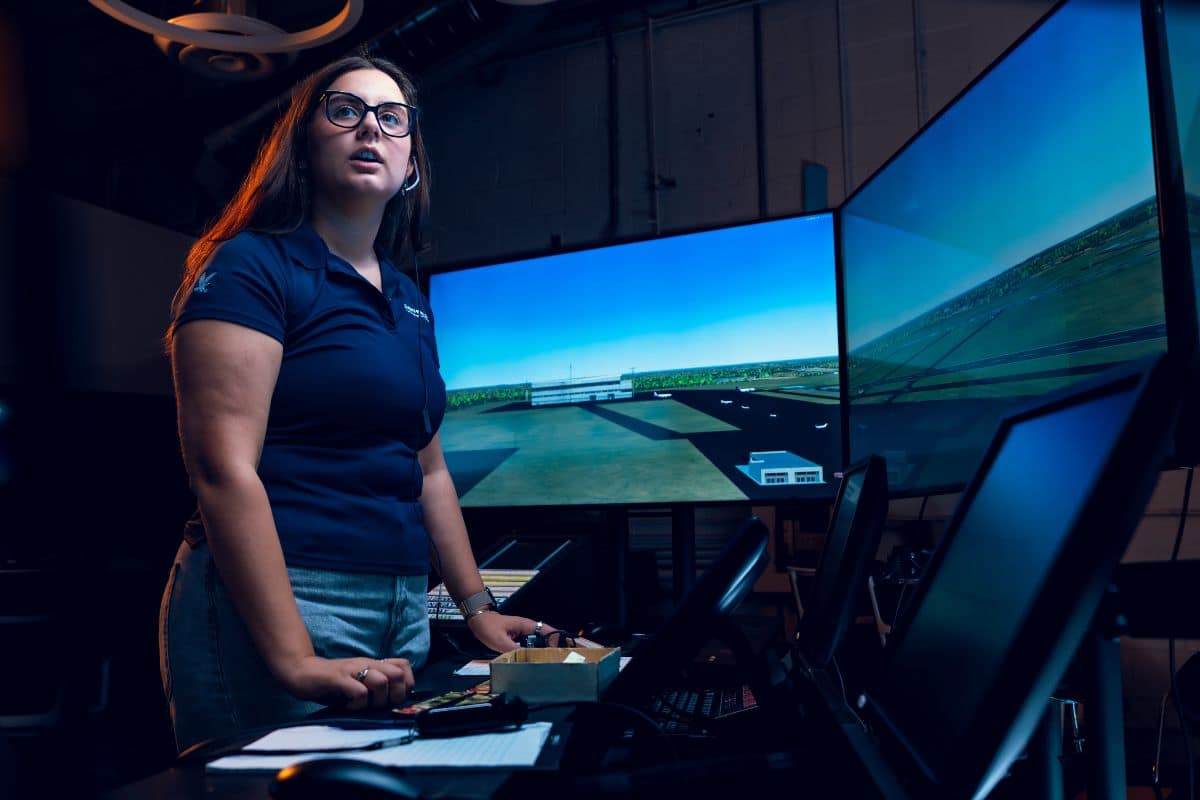Embry-Riddle Prescott Approved for Critical FAA Air Traffic Control Training Initiative

Graduates of the Air Traffic Management program at Embry-Riddle Aeronautical University’s Prescott, Arizona, campus can now be fast-tracked into towers for on-the-job training, paving the way for them to have an immediate impact in helping to fill controller ranks.
The FAA announced on Sept. 15 that it had signed an agreement with Embry-Riddle for the Air Traffic Management program at the Prescott Campus to join its Enhanced Air Traffic-Collegiate Training Initiative (AT-CTI). Embry-Riddle is the first university in Arizona to receive approval for the Enhanced AT-CTI program, the U.S. Department of Transportation announced in its news release.
The Enhanced AT-CTI program aims to strengthen the pipeline of air traffic controllers through university programs that offer the same thorough curriculum and advanced training technology as the FAA Academy in Oklahoma City. Graduates of Enhanced AT-CTI programs are placed directly in FAA facilities for localized training.
“We’re taking aggressive action at the FAA to recruit the best and brightest into our controller workforce by making the training process more efficient than ever," U.S. Transportation Secretary Sean P. Duffy said in the news release. "These jobs are critical to keeping our skies safe and with the expansion of our training capabilities through Enhanced AT-CTI schools, we are bolstering our aviation workforce and ushering in a higher volume of controllers beyond our previous capabilities."
The approval comes after the first cohort of students in the Air Traffic Management program at Embry-Riddle’s Daytona Beach, Florida, campus graduated from the Enhanced AT-CTI program last spring. The Daytona Beach Campus program was among the first to be certified by the FAA.
“We’re excited to partner with Embry-Riddle Aeronautical University on its second campus to strengthen our controller workforce and pipeline,” said FAA Administrator Bryan Bedford. “The safety of the National Airspace System is our number one priority, and the Enhanced AT-CTI program will help build the next generation of air traffic controllers.”

Kokenge works with Air Traffic Control lab manager Carol Martin. (Photo: Embry-Riddle/Connor McShane and Wilson Van Ness)
Embry-Riddle President P. Barry Butler said that "having both Air Traffic Management programs at Embry-Riddle’s Daytona Beach and Prescott campuses approved for this critical FAA initiative to strengthen the air traffic controller pipeline demonstrates the high level of training and education Embry-Riddle provides."
"We are proud to see our highly skilled, professional graduates immediately join the controller ranks for training to keep air traffic moving safely and efficiently," he added.
To be eligible for the Enhanced AT-CTI program, the FAA requires an extensive audit to ensure the university program provides the same high-level curriculum and advanced technology offered at the FAA Academy.
The Prescott Campus has recently upgraded its Air Traffic Control Laboratory with advanced simulators designed to replicate tower operations and equipped to run over a dozen FAA-aligned scenarios, said Kyle Wilkerson, assistant professor and program coordinator for the Air Traffic Management program.
“By training on the same scenarios used at the FAA Academy, students come out of our program ready to step into real-world operations,” said Wilkerson.
“As the national airspace grows more complex and the demand for air traffic controllers continues to rise, Embry-Riddle is ensuring that the next generation is ready to meet those challenges with clarity and confidence, starting from day one,” said Dr. Ken Witcher, chancellor of the Prescott Campus.
Relocated to Embry-Riddle’s Flight Line, the lab now boasts several high-definition, 180-degree tower simulators. Students, Wilkerson said, are constantly engaged with simulation scenarios that test their responses to weather challenges, traffic surges and emergency protocols.
“The more exposure you can give someone to an environment, the better they will be when they arrive in the real world,” he said. “The earlier we can catch and fix mistakes in training, the better.”
Brock McHood, an assistant in the Air Traffic Control Lab and a recent Aeronautical Science graduate with a minor in Air Traffic Management, said the additional space and specialized equipment will provide a more immersive training experience and allow instructors to give “more personalized support to students.”
Brian Roggow, interim dean for the College of Aviation, said the approval of the Prescott Campus for the FAA’s Enhanced AT-CTI program reinforces the university’s role in preparing aviation and aerospace professionals for some of the most critical positions in the industry.
“Attaining the enhanced collegiate training initiative authorization enhances our robust educational programs and provides students with improved pathways to support industry needs,” Roggow said.

 Keaton S. Ziem
Keaton S. Ziem